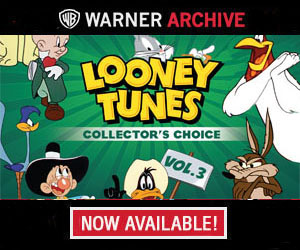
Shout! Factory has acquired the film library of independent animator Bill Plympton in a deal that encompasses all seven of the Plympton feature films (The Tune, I Married a Strange Person!, Mutant Aliens, Hair High, Idiots and Angels, Cheatin’, and his latest feature, Revengeance) – as well as over 50 of his shorts, including the Academy Award-nominated shorts Your Face and Guard Dog. In honor of this, I sat down to chat with Bill about each his features, his filmmaking process – and his transition from drawing on paper to going all-out digital.
Jerry Beck: Let’s just talk about your movies. This is your feature library. You made seven features, is that correct?
Bill Plympton: Yeah. The deal with Shout! includes a lot of my shorts too. I think maybe a couple hours of shorts. Something like that.
Jerry Beck: For the record, when did you start going digital? When did you stop using celluloid film?
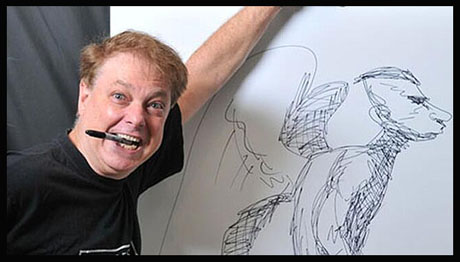
Bill Plympton: Yeah, that was in 2005 with Guard Dog, actually. I had no idea that I could go digital. One of my assistants said, “Bill, if you scan this on a scanner, you could do it all digitally and composite the foreground and the background.” I went, “Holy cow. This is great.” Before that I was working on film and doing the, working with negatives and prints – and the sound was also done on tape and that was a big headache. About 80% of all my expenses were on the technical side. Once I went digital, thank God… now I think 5% are our digital costs are on the mechanical, technical side. The other percentage goes to the artists, which is where it should be. That’s where the creativity comes in so they should get paid more than the lab technicians and all the tape houses and stuff like that.
Jerry Beck: Bill, you’re the King of the independent animators. We associate your style with drawing on paper and that paper look, which you still retain. But tell me about your transition to going that way, how exactly you do one of your films?
Bill Plympton: I still do pencil on paper, whether it’s a colored pencil or sometimes ball point pen or sometimes Sharpie and those are scanned on our scanner and then we scan the backgrounds separately. Then they are composited and on the background. And the great thing about that is we can manipulate it like crazy. I mean, instead of having to go back to the big huge camera, 35 millimeter camera and we’re shooting something together to move right, we can adjust it in a matter of seconds. That saves us so much time and money and heartache and headache. It’s really made my life in animation so much easier.
Also, we can manipulate the color and the shading and I can add a correction real quickly digitally. It just speeds everything up amazingly faster.
Jerry Beck: What I want to get it some comments on all of the features that you’ve done. Let’s start with The Tune. What led you to do a feature in the first place? You are and were super-successful doing shorts. Were you thinking, “I want to do something long form?”
Bill Plympton: The impetus for The Tune was when I put together a video cassette of all of my shorts up until, I believe 1990, maybe ’89, something like that. And that included a lot of the MTV stuff, like 25 Ways to Quit Smoking, How to Kiss etc. Those days. And I realized I had, I think, 58 minutes, which is almost an hour. I thought, “God. Over the last five years I’ve done almost a feature film.”
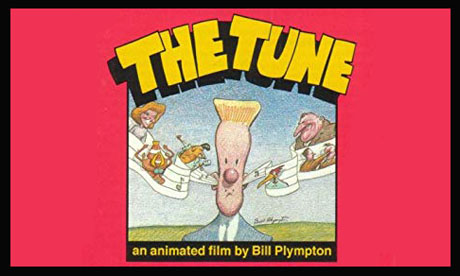
Bill Plympton: And that’s when it hit me that making a feature was attainable. I could actually make an animated feature film by myself – doing my own drawings and stories and everything. I called Maureen McElheron who did the music for Your Face. We were in a band together back in the ’70s. I said, “Maureen, let’s do a Yellow Submarine, only an American version, American music or country Western Delta blues, rockabilly, surfing music, jazz, that kind of stuff.” And she thought it was a great idea and we just started writing and recording music and it took about two years to make it. It was really fairly easy and I financed it through sales of my short films to MTV and other places. BBC, all over the world. I got halfway through the toon and I started running out of money and that’s when I got my first commercial. And that was for NutraSweet, the sugar thing – and also Trivial Pursuit – and with the money for those two commercials, I finished the picture.
Jerry Beck: Wasn’t it hard for you for most of these films to find distribution? Wasn’t that an issue?
Bill Plympton: Yes, it was a big issue. And I’m glad you brought that up because I don’t have an agent. I don’t have lawyers, I don’t have handlers or press people. It’s pretty much just me and my drawing pencil and my drawing board and I think that’s always been my draw back. If I had a big investor, a big behind me, then it could have been easier to find distribution. The films themselves, I think, are quite good. The reviews have always been amazing, I mean, out of the park. And the audiences love them. They applaud and laugh and everything. I don’t have the connections, the juice, as they say, to woo the big distributors.

Bill Plympton
Jerry Beck: Bill, how do you make your films? Do you do storyboard of the feature first, or do you write it as a script? What’s your process there?
Bill Plympton: Yeah. The first thing I do is come up with a really cool concept for a feature film. And once I have that, I make an outline, two pages of story points that I want to hit on, any ideas I want to use, character outlines. After that I do the two page outline, I work on it a lot and make changes. Then I’ll do a very crude storyboard and drawings that are very tiny, like thumbnails, maybe one inch big. That’s easy to fix too, if I want to make changes, if I want to move everything around and change the characters. That takes about two or three months.
Then I’ll do a more detailed storyboard and this one takes a lot longer because I had to design the characters. There are costumes, the backgrounds, all the vehicles and everything, or potentially. I will show it to friends, get some feedback on and maybe make some adjustments. And then once I have that, and I think that’s the most important part. If I get a really strong storyboard, something I like and my friends like, then I feel confident the film will be pretty good.
Then I go straight into doing a layout. That takes about a month or two to do the layout, which is just one page for each shot and it tells you what’s going on in that shot. After that I begin the animation and I put my layouts right there on my animation desk before I draw each shot. And that’s my guide to animating them. I’ll do the backgrounds the same time I’m doing the animation. Each shot has its own different background. Then I pass it over to my studio. They scan it, composite, clean it and show it to me – and if I like it, we color it.
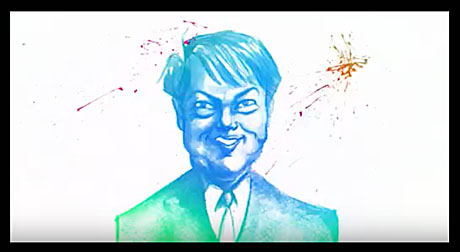
Jerry Beck: You are the principal artist, creator, designer, everything of these movies. I’m curious to know what your staff does. Do you have assistant animators?
Bill Plympton: Sure. Yeah. This is the one thing. I get a lot of this and I don’t know how many times I have to say it, but everybody asks, “Who does your inbetweens? ” I say, “I do every single drawing you see on the screen. It’s all drawn by me. For Hair High, I actually had some money in the bank and I hired a couple of animators. Those were friends of mine. And I realized after a week that they couldn’t match my style really the way I liked it and it was really expensive. Plus, it took all the fun out of it. I said, “Why am I paying people all this money when I really want to do the drawing?” That’s what I wanted to do.
I had to let them go and then I continued to do all the drawings myself. Right now in my studio I have about four people working here. I have one, John, been here for a long time. He runs the studio in terms of financial stuff, taxes, ordering stuff, distribution, carrying the films out to the festivals, and to the markets and publicity and all that. Then I have one producer whose name is Rachel and she manages the films, makes sure all the pieces fit together in terms of scanning, compositing, cleaning, coloring, making sure that the sound is ready and editing and putting all the pieces together. And then I have my wife Sandrine who does the background coloring and she does occur also for each shot. She designs the color. And then I have two artists who do the coloring and the scanning and the compositing. I guess that’s five people. It’s about five people.
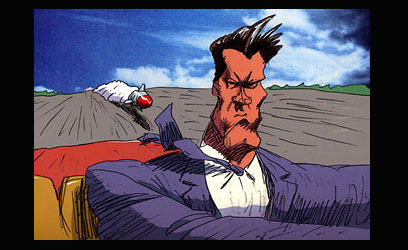
Jerry Beck: Your next film was… I Married a Strange Person. I think that was the second one, right?
Bill Plympton: Yeah. I did Mondo Plympton (a compilation of shorts) and I know you don’t believe it’s a feature, but it did get distribution in theaters. But that isn’t really part of the Shout! Package, so no sense in talking about it.
Jerry Beck: I know in The Tune you were aiming for doing a musical. What was the thinking of I Married a Strange Person? Science Fiction? What was the catalyst of the idea behind that one?
Bill Plympton: I’d seen some Japanese animation. I don’t know which film, Wicked City maybe. I was just amazed in how far they pushed the envelope in terms of sex and animation, the surrealism, and it’s just the outrageousness of the Japanese animation. I said, “I want to do that, but I want to make it funny.” Being an artist, I basically make up these worlds out of my imagination. Very godlike creator. I thought, “Wouldn’t it be funny if some guy accidentally got those God-like powers to create worlds just out of his imagination?”
The film, when it premiered at Sundance, and the response was great. Really great response, but nobody was itching to buy it. No distributors wanted to touch it. I think they were afraid it was too off the wall, which it is. It’s a very weird film. And I was running to the bus and the guy from Lionsgate, I forget his name now, Tom something, was there and I met him somewhere and I gave him one of my cards and I said, “Did you see I Married a Strange Person?” “No, I didn’t get around to see it. “
And there was a snowboarder standing right next to me on the bus and he had a snowboard, he was covered in snow and wearing the goggles and everything. “Dude, you made I Married a Strange Person? That fucking rocked! That was a killer film.” Tom says, “Maybe I should check out your film.” He saw it, he loved it and he made me a really sweet advance. Probably the best deal I had of all my films and we were not actually getting royalty, a big substantial royalty for the film. That little snowboarder guy changed my career.
Jerry Beck: That’s great.
Bill Plympton: Things like that happen. Yeah.
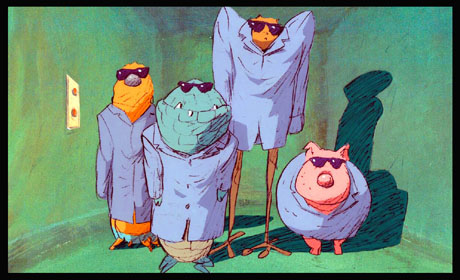
Jerry Beck: Mutant Aliens. Give me your catalyst on that one.
Bill Plympton: I read an article about Laika the dog, the cosmonaut dog from Russia, who was shot into space. I wondered, “Jesus, is that dog still up there circling the planet?” Certainly he’s dead by now, but there must be a ton of animals, a whole zoo of animals up in space floating around in tin cans. And then I was reading a fictional book about a really bizarre psychedelic zoo where they interbred all these animals to create monsters and really creepy animals. And I thought about the idea of all the animals shot into space interacting and breeding and creating these really mutant aliens basically. And they came back for their revenge to the space agencies and they wanted to create havoc.
I thought that was a funny idea. I’d never heard of it before. I thought, “Let’s make a film about that.” And also, it’d be the first time I ever really created a bunch of animal films like Mickey Mouse or Ice Age or something like that. I wasn’t really dealing with animals. I thought that would be an adventure with that.
It also was accepted in Sundance and I went there for the premier and it was a Saturday night show, I think. I think it started at 10:00 and around 5:00 it was a blizzard and a really horrendous blizzard and that took down our audience by about 50% and then the sound – our sound person who it really is a nice person and really did a good job – but she couldn’t get the levels balanced. The sound was way out of whack and she was freaking out and people were walking out throughout the whole film and it’s just really was probably the worst screening I’d ever had. And it chilled my chances for distribution. That’s why we went independent distribution on that one.
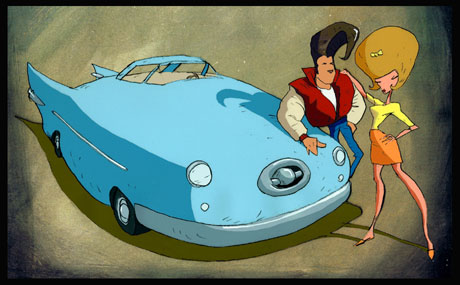
Jerry Beck: Let’s talk about Hair High. I still remember seeing that at the San Diego Comic Con.
Bill Plympton: Well, on this film I was really disappointed with the release of Mutant Aliens, a lot because of the Sundance screening. For this one I said, “I’m going to make this film really professional.” The story, again, autobiographical about my days of high school, which I thought was good material and Martha Plympton is a relative. She’s not my cousin, but she’s a close relative, a big supporter. I got her involved and we were out drinking one night and I said, “The problem with my films, I don’t have any star power. I need some big name star power.” And she said, “Well, let me make some phone calls and stuff.” She lined up a, really, a great list of actors. David Carradine and Keith Carradine, Sarah Silverman and Beverly Dangelo, some really cool people. We were even talking to Luke Perry. And he was very interested in doing it, but as agent said, “No, no. You have to do Disney films. You’re not going to do this kind of stuff.” That aside, we had a really great list of actors. I spent a lot of money on SAG and the of course the audio sessions. I was really feeling good about it, but it wasn’t accepted into the Sundance, but it was the opening night film of Slamdance. Slamdance is a good festival, but it doesn’t get the distributors that Sundance does. Again, the reviews were great, but we couldn’t get any major distributor. We got a small art theater distributor kind of guy. The most I’ve ever spent on a film, but I still love watching it. Really, really cool film.
Jerry Beck: To me, the next two films, you’re getting serious. First, Idiots and Angels, that was a darker film for you. Am I right about that?
Bill Plympton: Yeah, that was a backlash against Hair High because Hair High really didn’t perform as well as I had hoped. This was the first feature film I did digitally. Hair High was shot on a rostrum camera and by the time I did Idiots and Angels, I was doing digital scanning. This was really low budget on almost 150,000, maybe even less. And it’s just almost a personal film. It was just like, “I’m going to this film just for me.” It’s much darker, like you say, a film noir and no voices at all, actually. Screw Hollywood actors. I’m going no voices. And it actually was much more successful than Hair High. It really did pretty well. We sold to Netflix and we sold a bunch of places. it taught me a lesson that maybe I shouldn’t go Hollywood. Maybe I should stick to my New York noir roots and just do personal films.
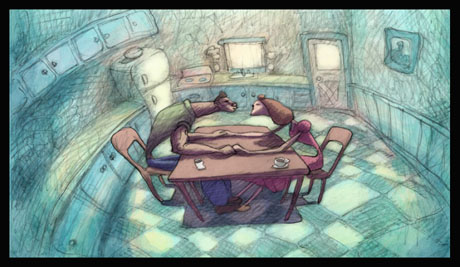
Jerry Beck: I’m going to reveal a bias and say that Cheatin’ is my favorite of your features.
Bill Plympton: Thank you.
Jerry Beck: I just happened to pull up the poster just to remind myself, and I love the color design on that poster. I remember I loved everything about that one in particular. It says on the poster, I guess I forgot this. It says Kickstarter. What was the story behind this movie? Going into this one, what was this about?
Bill Plympton: Yeah, I don’t know where the concept for that film came from. I just thought it’d be interesting to do a film about this very loving, romantic couple. And because of misinformation or confusion, or communication, they think each other is cheating on them and the lengths they go to get revenge. It sort of reminds me of that song Love Hurts. It’s just like love is supposed to be beautiful, but in this film, love is very dangerous and deadly. That was my original concept.
There’s more color in this film than Idiots and Angels, but again, there’s no dialogue. Maybe one word or two words, I think. That really simplifies, it really streamlines the production when you don’t have lip sync and that’s just a bunch of stories told visually with the music. The music and the sound effects tell the story. And again, this one was pretty popular. It’s sold to Netflix and a bunch of other places too and so on. I was really happy with this film. It did very well in Europe.
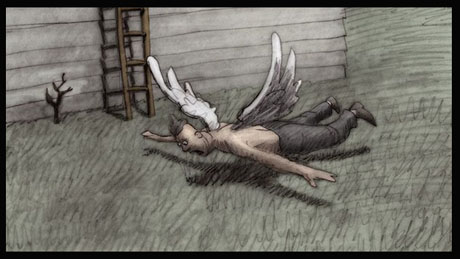
Jerry Beck: To me, and I’m going to throw in an editorial comment here to you, back to you Mr. Plympton, a big compliment. I think right from Your Face onward to this day, you are a master at the shorts. No question. To me, you don’t have a high point and because you started out high and you stay there and I’m not just kissing your ass right now. That’s what I believe. You haven’t really dipped. Your stuff is great. Your shorts are spectacular. I think there’s reasons for that because of your, just the way you were trained or the way your background in print cartoons and all that.
But the thing is with features, it’s a different animal. I will say that Idiots and Angels and Cheatin’ in particular, in my opinion, this is you – as an artist. The artwork as at a different level. It’s more mature and the artwork, the color, the design, going pantomime. Just great.
I’m going to be honest, Bill. Don’t kill me. But I have not seen Revengeance. Okay? For all I know that’s your masterpiece, but I don’t know. You had a partner on that? Jim Lujan?
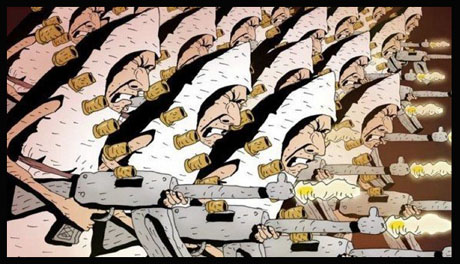
Bill Plympton: Yeah. After going to San Diego Comic Con a number of times this guy, Jim Lujan kept bugging me. “Oh, look at my animation films.” He’d give me a DVD and the artwork was really pretty crude. It really wasn’t that well drawn. I kind of dismissed him as another wannabe and then about a year later I was nothing to do and I just happened to see his DVD. I put it on and I just was really impressed by the writing and the stories. His stories were hilarious and the characters really had a heart and soul that I really loved. I called him up and I said, “Let’s make a film together.” And I of course he was very happy to hear that.
He wrote the script. He wrote it in about two or three months I think and he designed the characters and at first I was going to make them more Plympton-esque. When I did that, it just didn’t fit. It didn’t fit the story. I realized that his character designs were the best. They’re a little crude and raw and underground comic, but that really fit the story. I went along with his designs and I was just the production team. He did everything else. He did the story and the voices and the design and the layout. I took the storyboard, the layouts and the animation and put all the pieces together. It’s really more of his film than my film, but it’s a really funny film. Especially a good look at the sleazy part of LA, which I know you hear some great stuff there.
It’s all about drug dealing and politics and bikers and religious cults. Just everything sleazy about life in the big city. I said, “This is for me. This is something I want to do.”
Jerry Beck: I’m going to watch it on the Shout! Factory home video. I guess, in conclusion, and this is probably an unfair question, they’re probably all your babies, but do you have a particular favorite or the one that means a lot to you of all of them? What do you think?
Bill Plympton: Yeah, I think you’re right. Cheatin’ really connects with me. I think that by the time I did Cheatin’ all the skills had come together and it is a unique film. I’m influenced a lot by David Lynch and his early films and so I sort of went on my own road on this one and I feel that is a personal piece of art more than a commercial venture.
- Global Icons and Fleischer Studios Announce New Brand Collaborations for Animated Icon Betty Boop - April 10, 2024
- Cartoon Network Launches Digital Experience For It’s Staircase - April 8, 2024
- Netflix “That Christmas” Announces Cast - March 20, 2024


 October 30th, 2019
October 30th, 2019  Jerry Beck
Jerry Beck  Posted in
Posted in  Tags:
Tags: 


